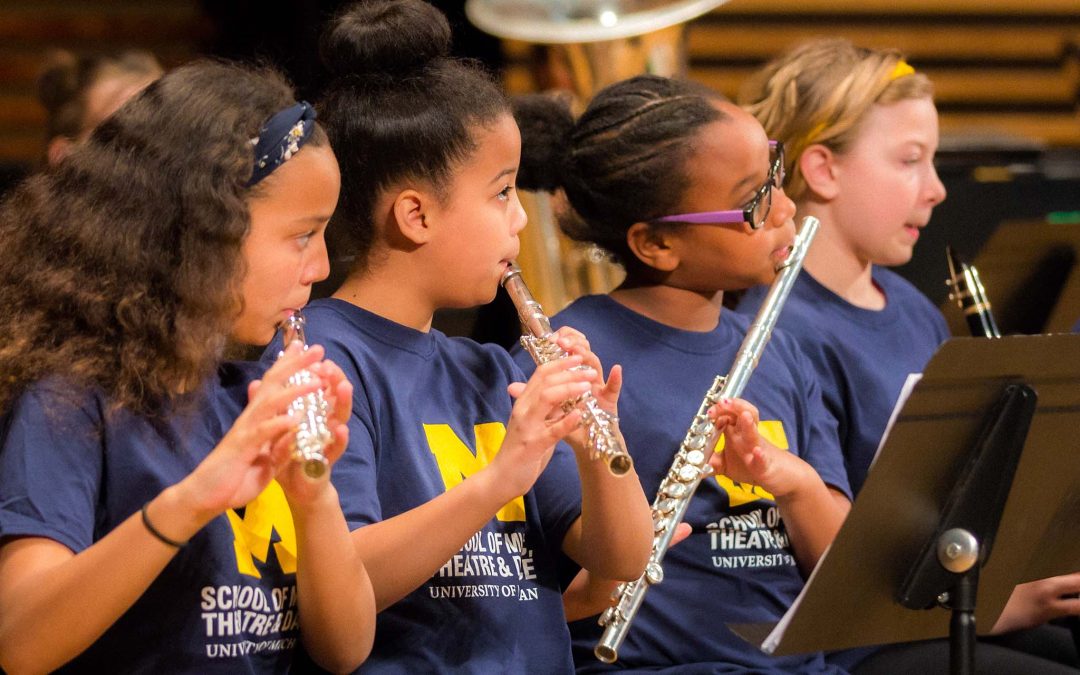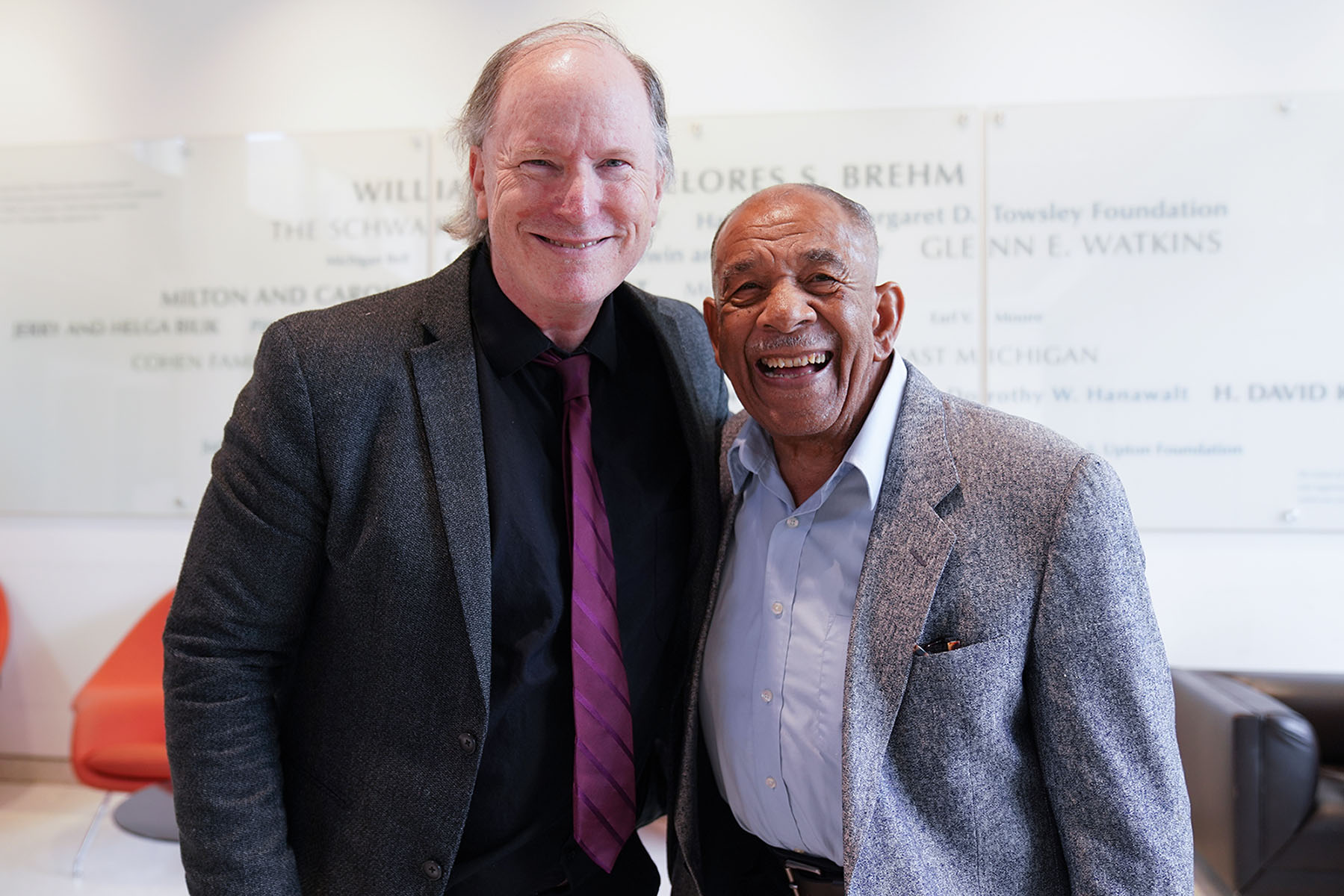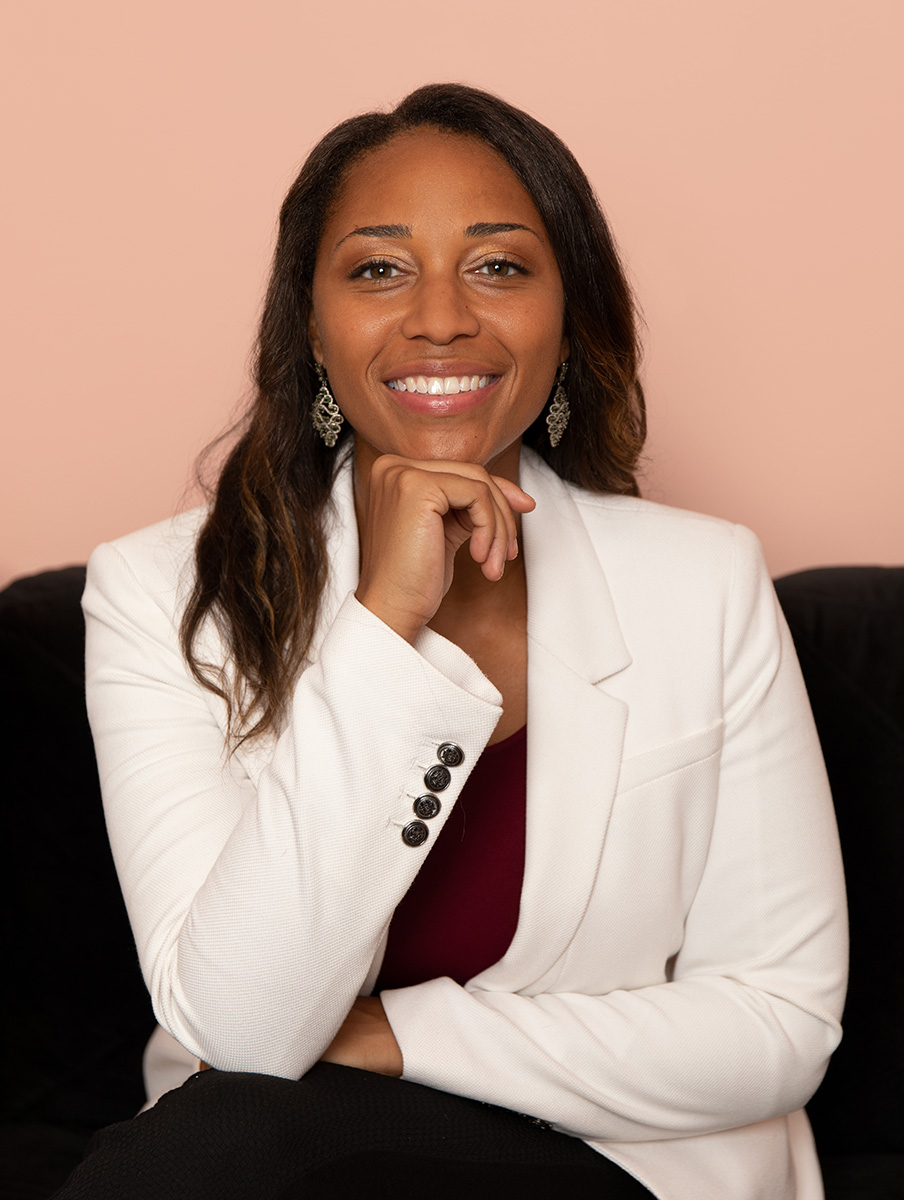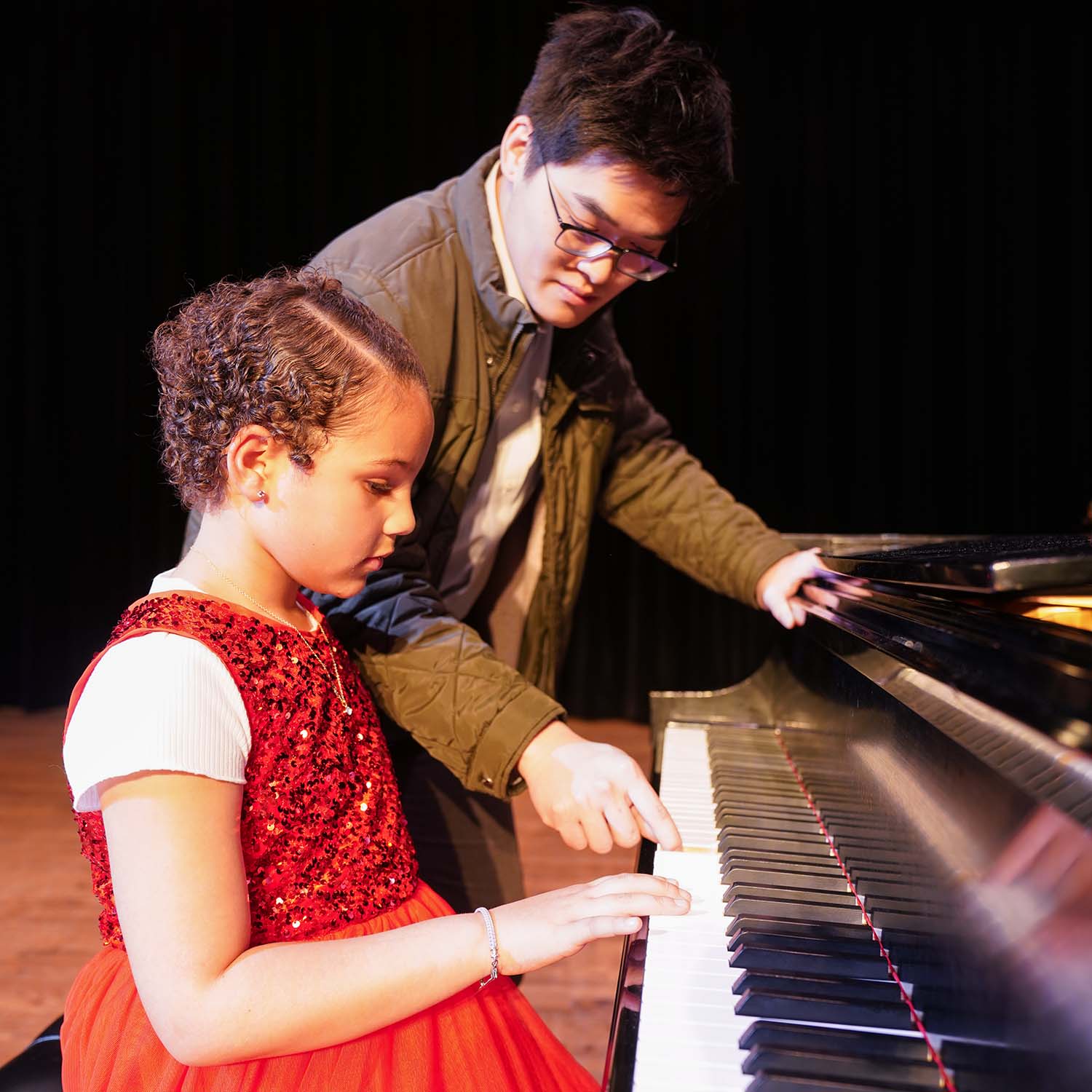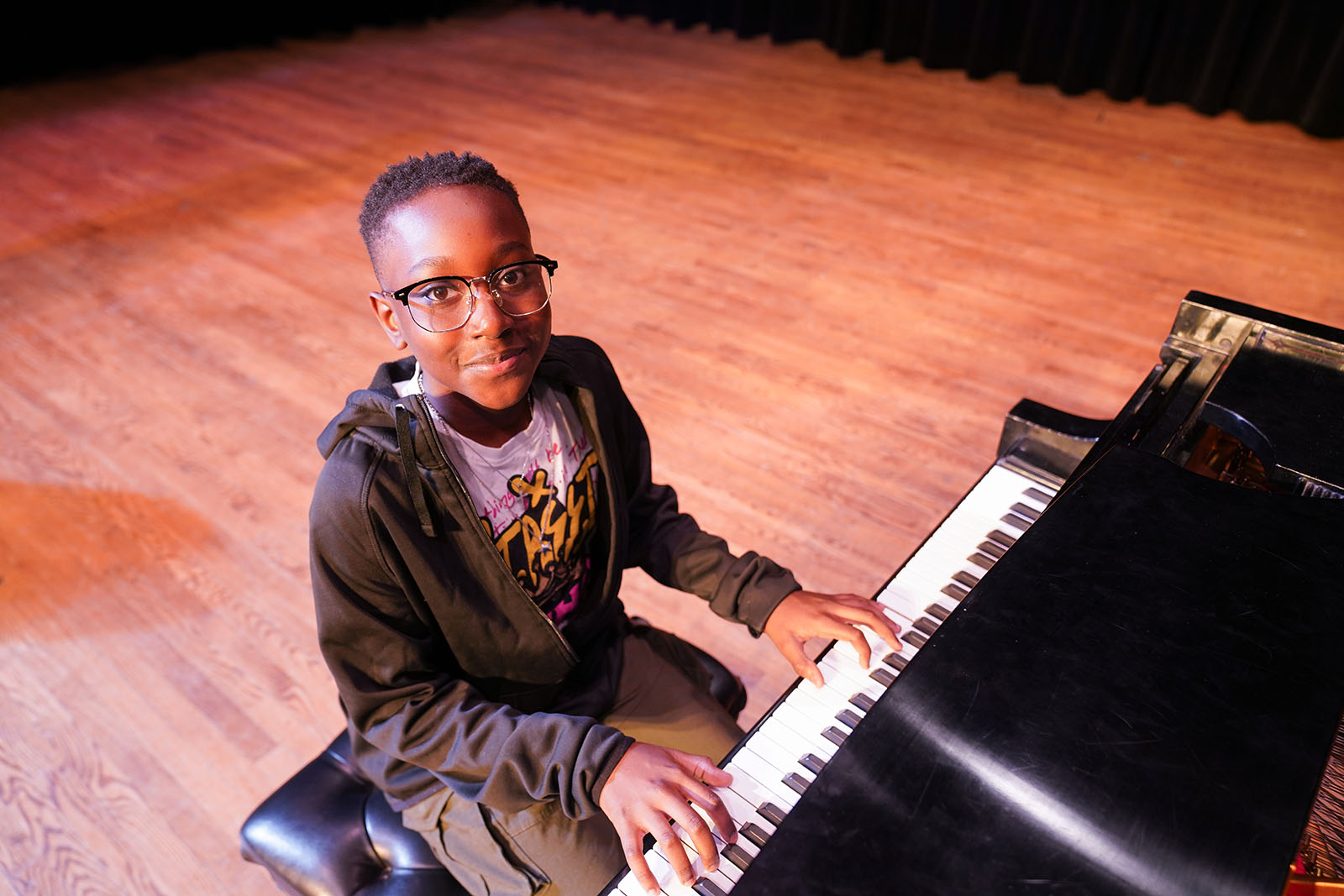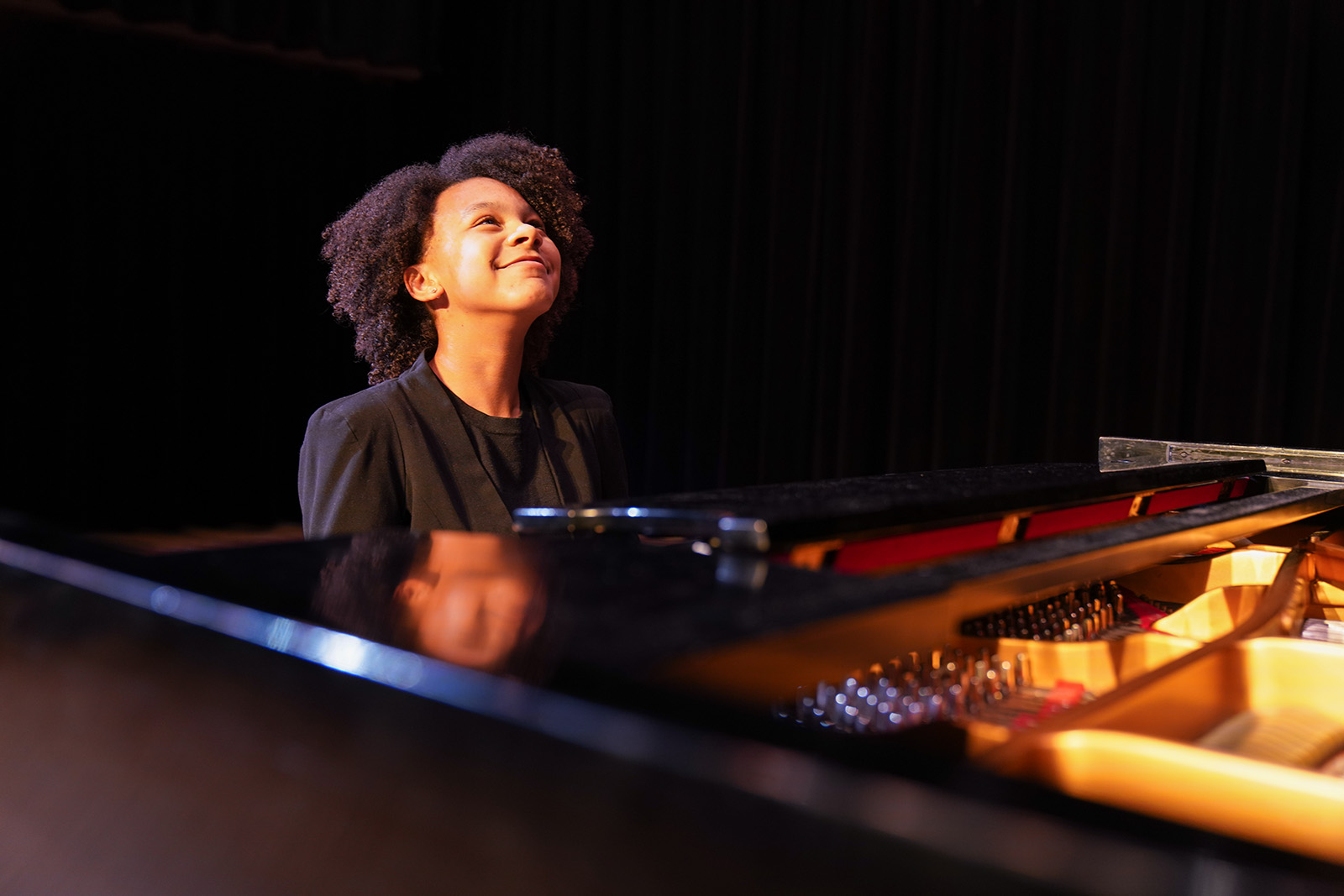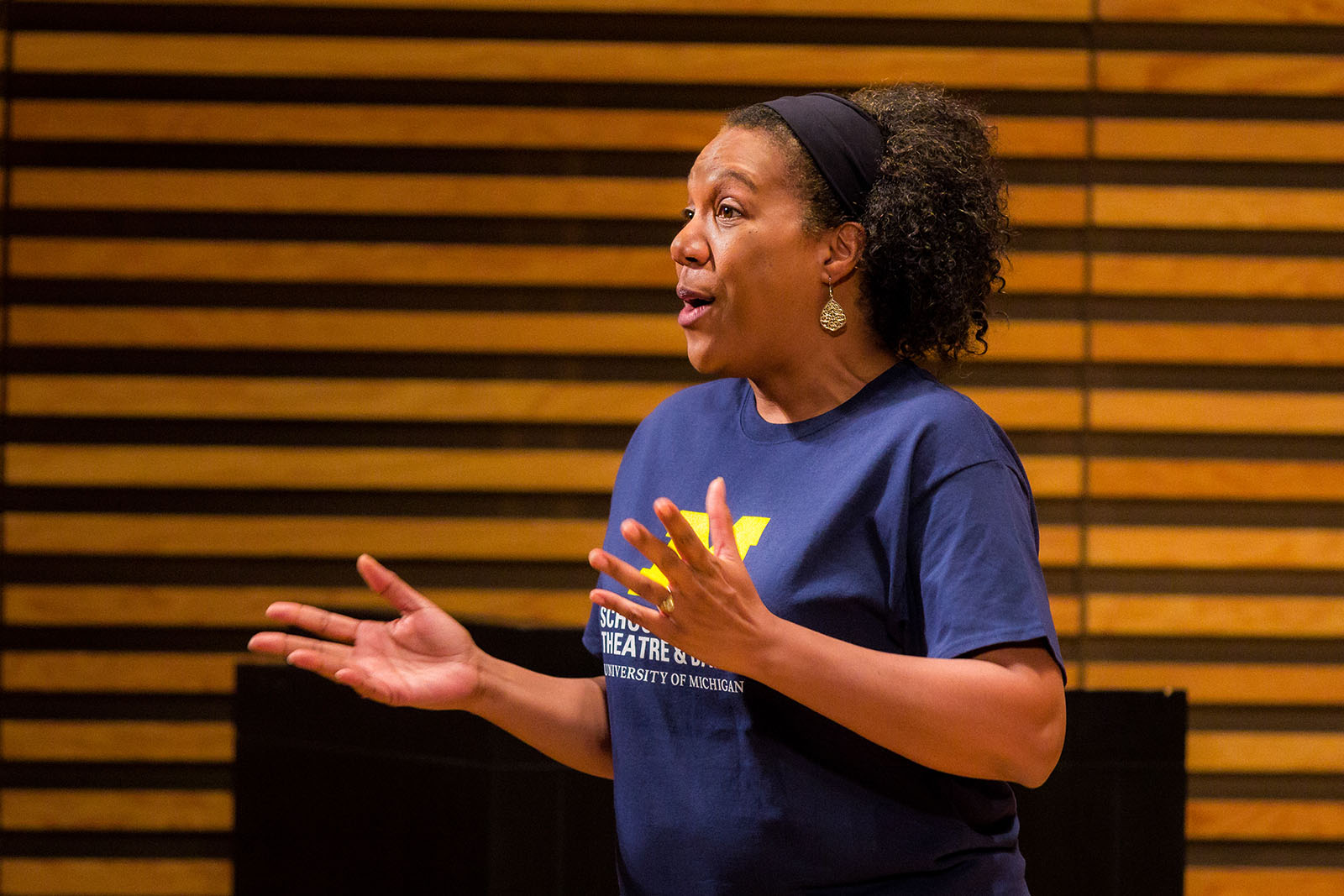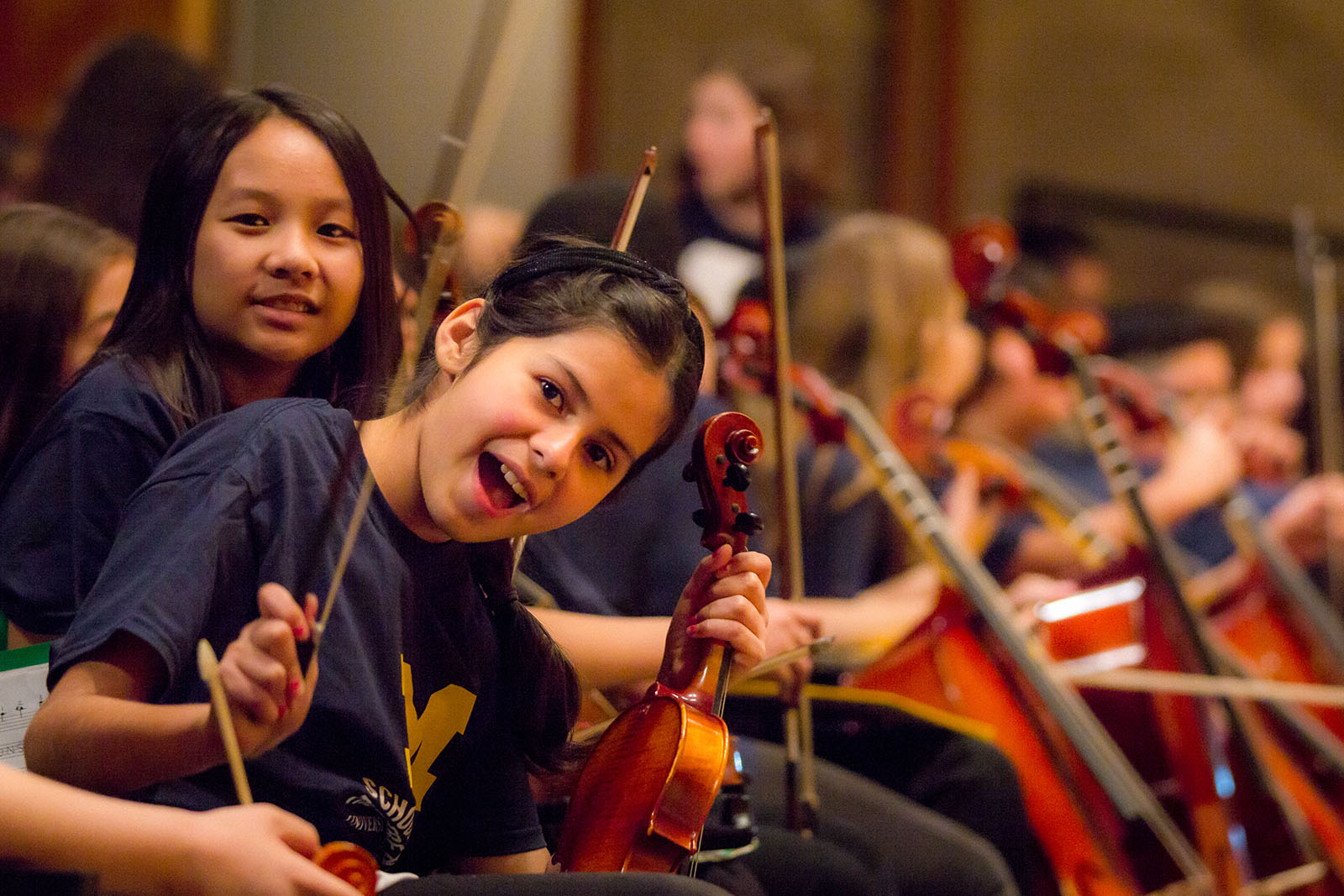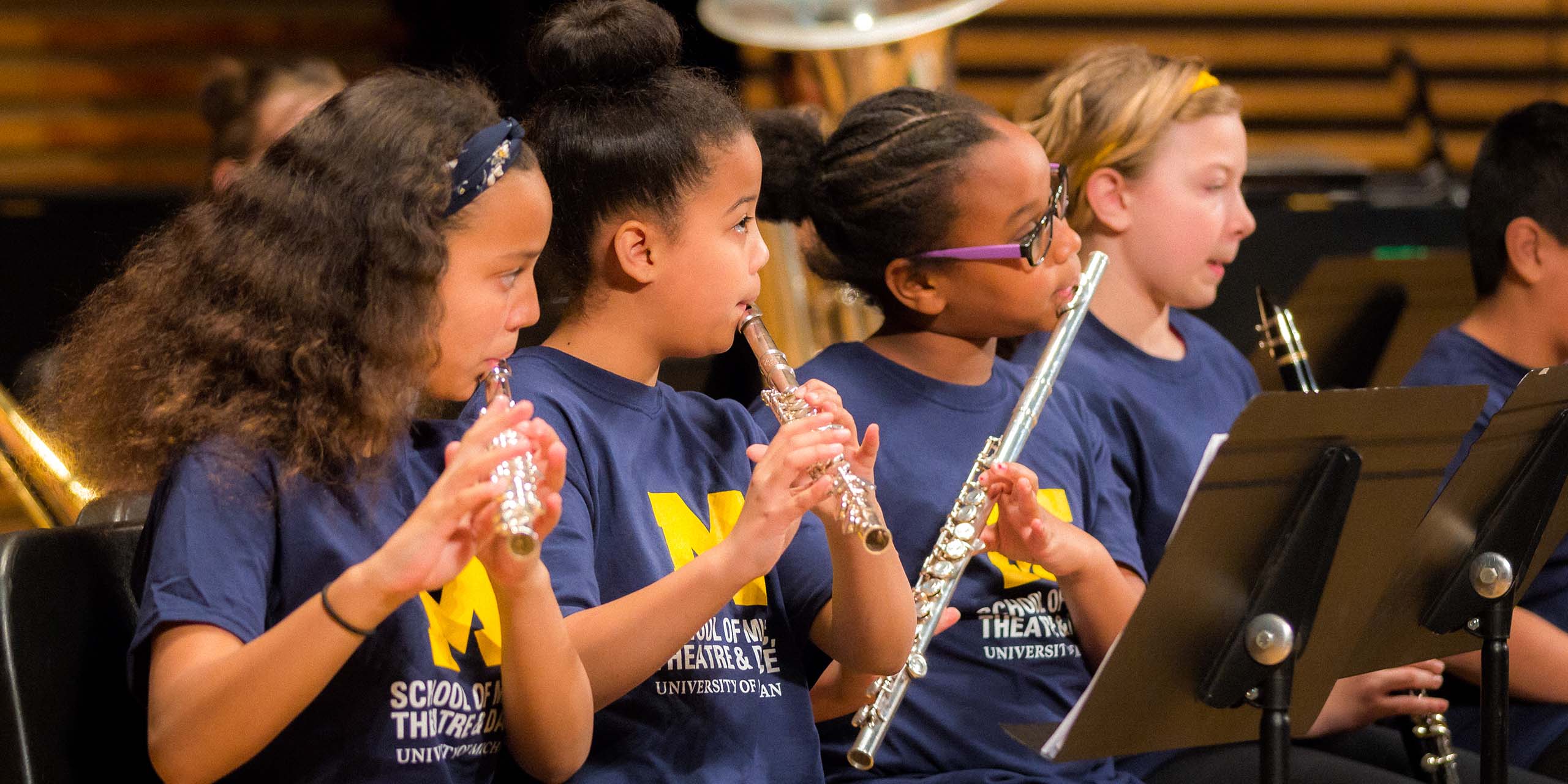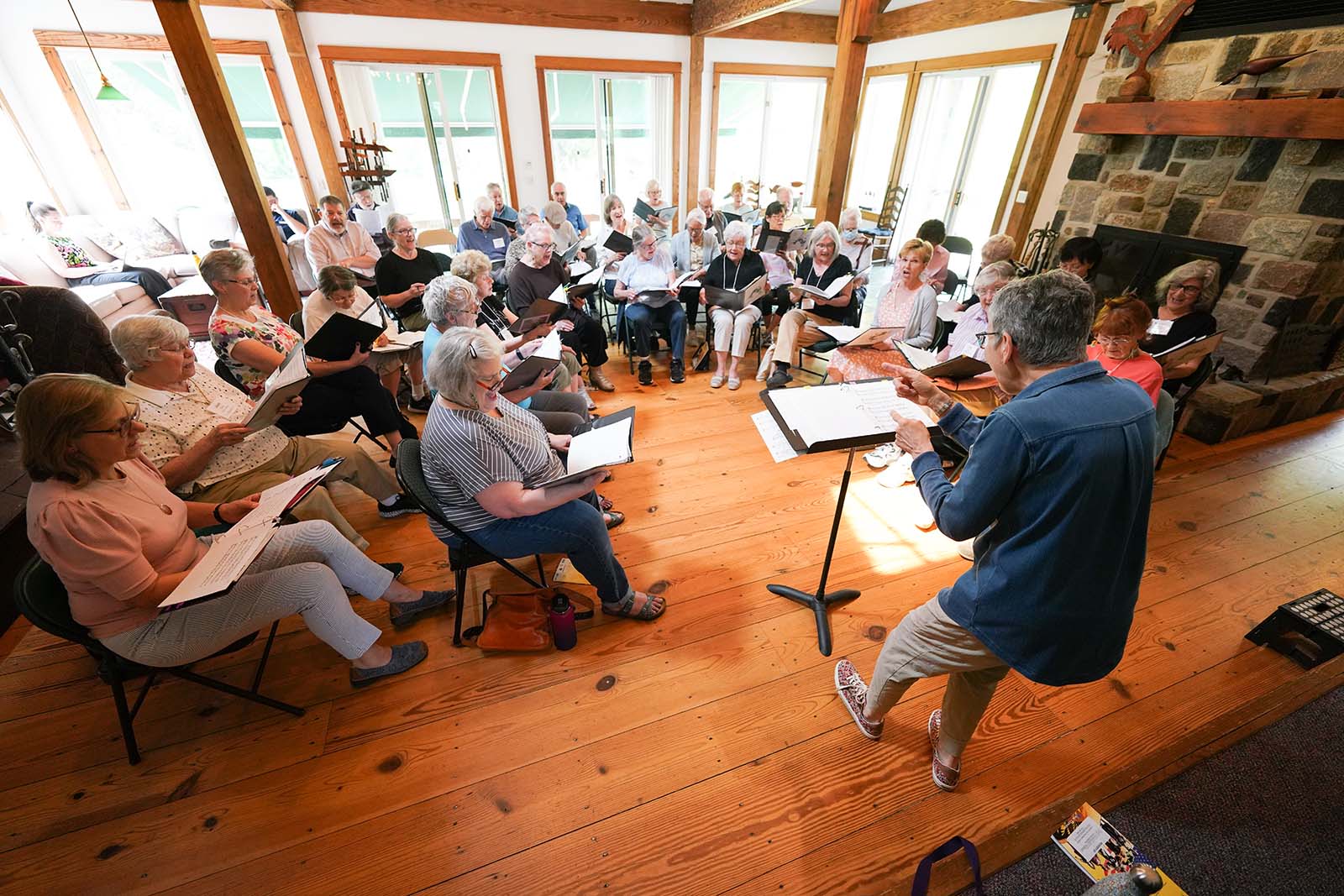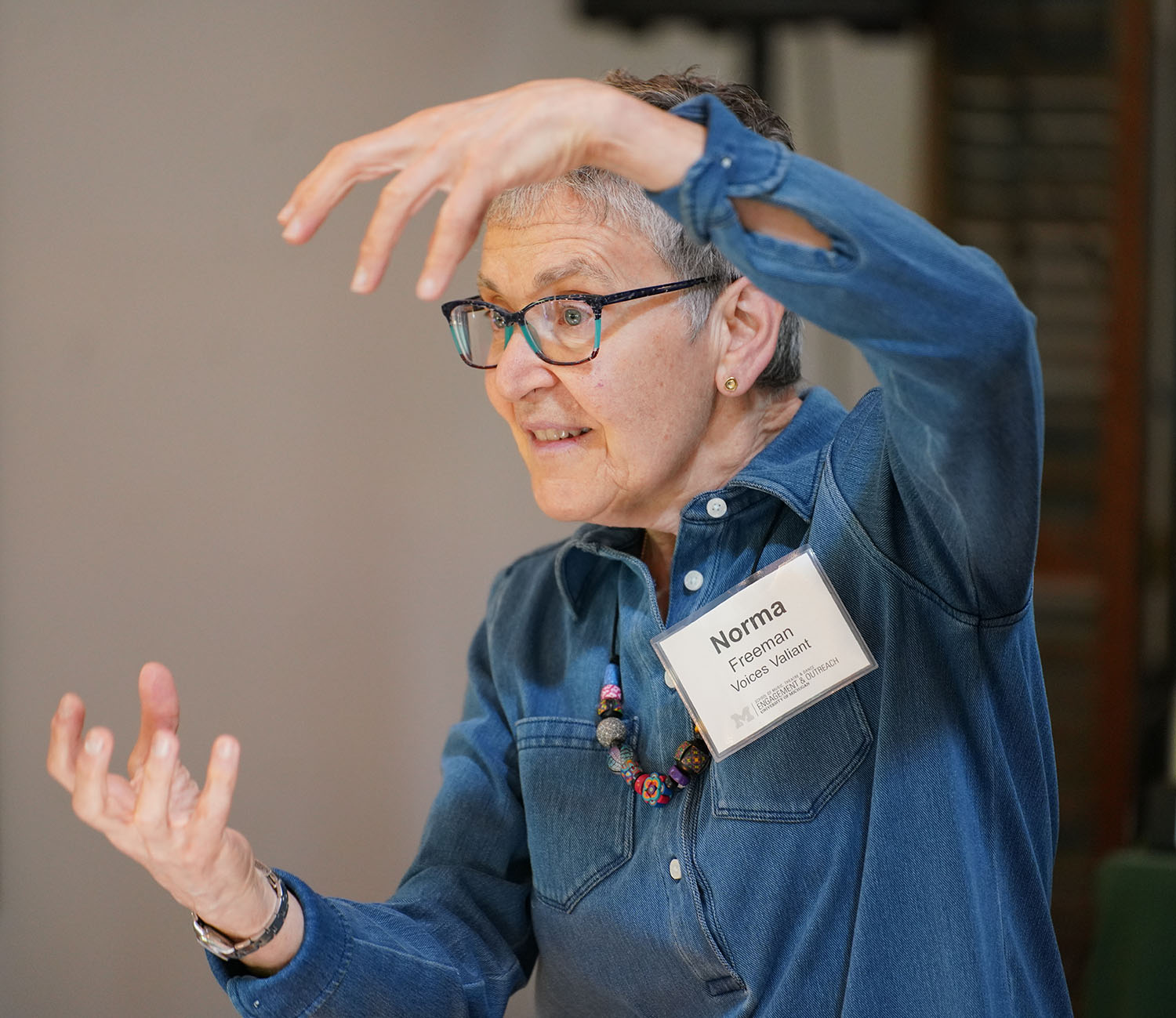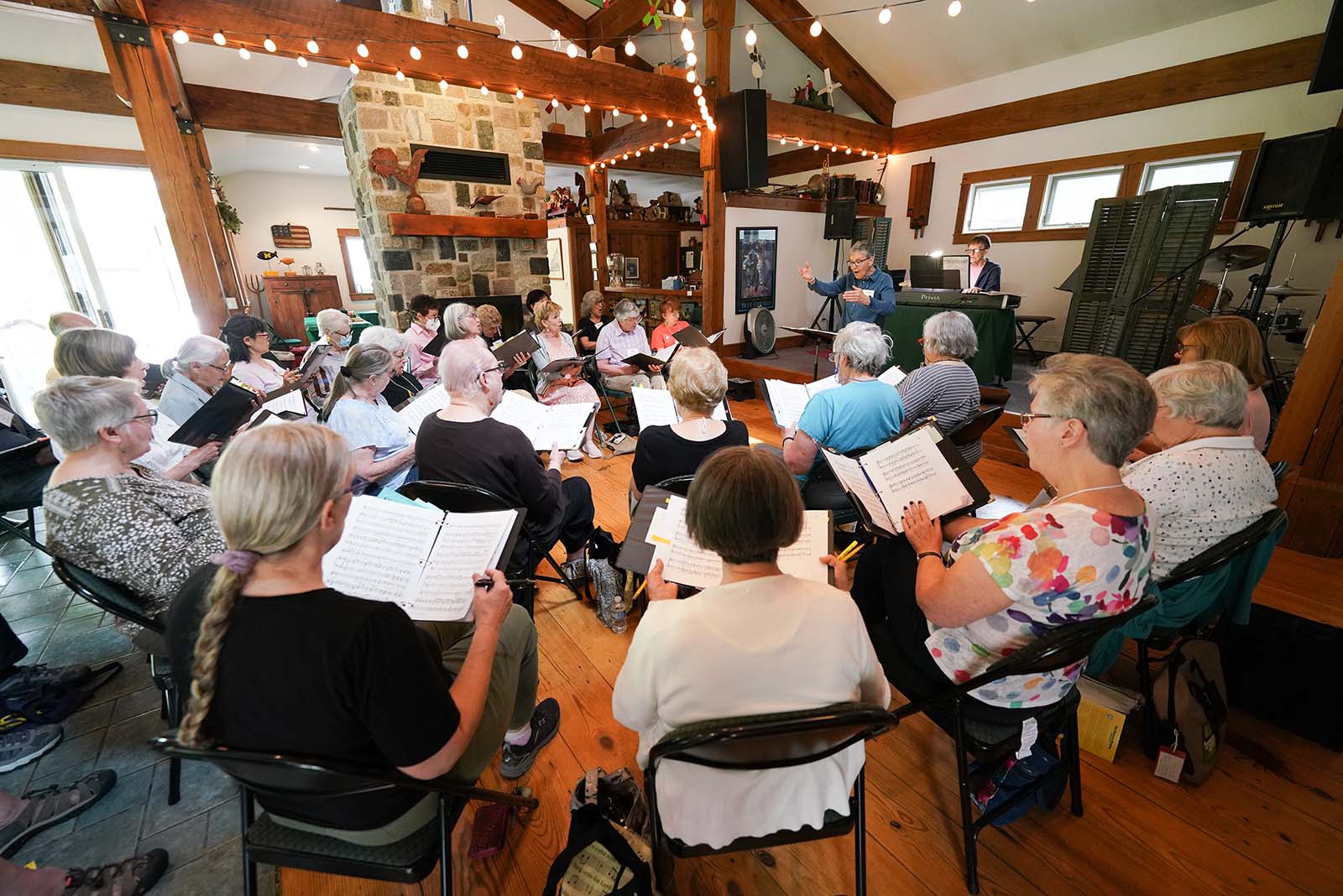Michigan Muse Summer 2023 > Sharing the Joy – Performing Arts Community Programs
Sharing the Joy of the Performing Arts Through Community Programs
By Judy Galens
On any given Saturday during the school year, young piano players can be heard practicing in the Earl V. Moore Building on North Campus, learning new music, conferring with instructors, and sharing what they’ve learned with their peers. These players are not students at the School of Music, Theatre & Dance – or not yet, anyway. They are school-age participants learning how to play piano in a partnership program between SMTD and Willis Patterson’s Our Own Thing, a nonprofit community organization based in the greater Ann Arbor area.
Our Own Thing began in the late 1960s, formed by Patterson, professor emeritus of voice and former associate dean of SMTD. It started as a choral group celebrating the music of African American composers and an instructional program offering free lessons in the arts to area children. Decades later, an SMTD student who worked with Our Own Thing while pursuing a graduate degree had an inspired idea – to formally connect Our Own Thing and SMTD to offer free piano instruction to children in the community, taught by SMTD students.
Leah Claiborne (MM ’14, DMA ’18, piano pedagogy & performance) had a passion for performing and teaching her instrument, and she wanted to bring children “the joy of music through piano,” she said. She also wanted children from culturally diverse communities to have something she didn’t have as a young person. “I often imagine how impactful it would have been in my fundamental years to have other people who looked like me studying classical piano music, and to have my teachers also include music by Black composers in the teaching repertoire.” When she brought the idea of this partnership to Patterson and John Ellis, associate professor of music and, at the time, associate dean for productions, programs, and partnerships, they immediately saw its value.
Part of Patterson’s goal for starting Our Own Thing nearly 50 years earlier had been the desire to provide musical opportunities to children whose families could not afford private instruction, enabling them to pursue music in high school and beyond, if they chose. That goal resonated strongly with Ellis, who recognized the value of the partnership for SMTD students as well. “As an institution of higher education,” he reflected, “we have to be training our students to form reciprocal relationships with the communities in which they are making their art and teaching their art, and they also have to learn from the community to make their own art alive.”
Jacob Wang (right) (BM ’22, piano; MM ’24, piano pedagogy & performance) working with a student at the Our Own Thing piano program recital, April 2023.
The Our Own Thing piano program launched in 2017 and was overseen by Claiborne until she graduated from SMTD in 2018. After that, SMTD’s Engagement & Outreach team began managing the program. Open to children from kindergarten through high school, the classes are held on Saturdays from November through May. Reflecting what Ellis describes as a “student-centered and family-centered program,” the Saturday sessions focus on what the participants want to learn, whether it’s classical, rap, pop, African American folk songs, or church music. They also dabble in music theory and piano technique. They have group sessions with Ellis as well as private and semi-private lessons with SMTD students. The participants struggle, they succeed, they struggle some more, and at the end of the year, they present the results of their hard work in a recital, their proud parents cheering them on. “It is a delight to see students and teachers exploring multiple genres,” Ellis said, “and our final recitals reflect that joyous search.”
Looking back on her experience with the Our Own Thing piano program, Leah Claiborne – now an assistant professor of music at the University of the District of Columbia – realizes its effect on her life and career. “It was by far the highlight of my time at SMTD, and I am still reaping the benefits of taking the chance to prioritize community engagement and advocacy of diverse literature in my professional world.” She wishes a similar experience for SMTD students now involved with Our Own Thing. “I am hopeful that the current SMTD students will also be able to step away from this program and look back at the impact they have had in each of these children’s and families’ lives. It is an absolutely amazing program that highlights how community enrichment at the forefront of higher education can impact our world.”
Students at the Our Own Thing piano program recital, April 2023.
The Expanding Mission of Engagement & Outreach
Led from its inception in 2010 by Sarah Jane Rau, the Engagement & Outreach team had begun by managing long-standing youth and adult programs, including the Michigan Youth Ensembles and the MPulse Summer Performing Arts Institutes, formerly known as the All State at Interlochen Summer Program. These programs connect middle and high school students who are interested in all aspects of the performing arts with SMTD faculty and students, offering instruction and mentorship.
In addition to the tuition-based youth and adult programs, Rau soon began exploring ways to develop new programs focused on sharing SMTD resources with community organizations, from nonprofits to hospitals to public school systems and beyond. A former public school teacher in Midland, Michigan, who had also worked with arts and nonprofit organizations in New York City, she understood well how unequal access to the arts reduces students’ opportunities. Robin Myrick (BFA ’89, musical theatre), a former music and drama classroom teacher with extensive arts management experience, was right there with Rau every step of the way. Myrick had been hired onto the Engagement & Outreach team not long after Rau, and they both felt strongly about expanding the mission of the team, with the full support of SMTD.
As Rau described it, community-focused programming would have to satisfy several criteria: it would be developed organically, by “listening to what the community needs, and then helping to provide it.” It would be a true partnership, giving organizations a voice not just in the planning but throughout the implementation. And it would be free for all participants.
Leveling the Playing Field with the M-STARs Program
In just a few years, with a team of committed and dedicated staff members, E&O has developed a number of thriving community partnership programs, collaborating with the Detroit and Ann Arbor public school systems, theatre organizations, U-M Mott Children’s Hospital, several senior living centers, and more. Many of these programs fall under the umbrella of Michigan’s Success Through Artistry & Readiness program, better known as M-STARs, which is funded in part by the Michigan Arts and Culture Council. The goal of M-STARs is to provide broad access to arts education and participation, and to build a college-going culture for young artists underrepresented in arts higher education.
Similar to Our Own Thing, the partnership with two Ann Arbor public schools that share a parking lot – Mitchell Elementary and Scarlett Middle School – is an applied music program, offering private and semi-private instruction for students from fifth grade through eighth grade. The need for such instruction came about because of economic disparity within the district. “Ann Arbor is such an amazing school district,” Rau noted, “but not everyone in Ann Arbor has the money for private lessons. And what’s happening is, by the time they get to high school placements for bands, orchestra, and choirs, there is this huge skills gap between the students who can afford private lessons and those who cannot.”
For the Mitchell-Scarlett program, students stay after school two days a week to work with instructors one-on-one or in small groups; snacks and bus transportation home are provided. Each year, the curriculum is developed by an SMTD graduate student in music education, in collaboration with the partnering music teacher. The instruction is provided by music performance students. This past year, the cohort of instructors happened to include a large number of composition students, which enabled the Mitchell-Scarlett students to see themselves not just as budding musicians, but as composers. “It was great, because the SMTD students were able to work with the kids and bring out this new creativity,” Myrick said. “It’s completely game-changing. It’s almost like a brand-new program.” The instructors work with the older students to prepare audition materials for high school ensembles and so far, the results have been especially positive. “We’ve been seeing people get more placements in their high school band and orchestra,” Myrick noted.
Among the many programs overseen by the Engagement & Outreach team are a number of initiatives with Detroit Public Schools, including five high schools and three middle schools. Programs in the high schools vary depending on their needs, from dance and vocal workshops to guidance about applying and auditioning for a college-level performing arts program.
The newest initiative with Detroit schools is part of a national program called JumpStart Theatre, which launches new musical theatre programs in middle schools. JumpStart is itself a collaboration between the Educational Theatre Foundation, the theatrical licensing agency Music Theatre International (MTI), and iTheatrics, which creates “junior” Broadway musical adaptations for K-12 schools and community theatres. The goal of the program is to spend three years helping a school build a sustainable theatre program. In addition to the resources JumpStart provides, SMTD students and staff mentor the teachers on everything from creative aspects to managing the production schedule, publicity, and ticket sales.
Becoming Artists and Citizens
SMTD students interested in working with these partner programs are not simply thrust into classrooms or hospitals or nursing facilities to fend for themselves. First they become Michigan Artist Citizens, or MACs, a process involving an application (with a faculty recommendation), a matching process, and substantial training. The first part of the training, conducted by Myrick, focuses on ethical community engagement. The second part is conducted by the partner organization and, Rau explained, allows the organization to make a necessary introduction: “Here’s our community. Here’s how you approach our community. Here’s what our community needs and wants.” Signaling the importance of the MAC program to the school, beginning in fall ’23, SMTD students will earn academic credit for participating.
In the very definition of a mutually beneficial relationship, SMTD students lend energy, enthusiasm, and talent to these programs, and in turn they gain valuable teaching experience. They step outside their busy lives and become immersed in local communities. Like the students they are teaching, they acquire new skills and understanding, as stated by Zongxi Li, a trombone player earning a master’s degree in chamber music: “While working with the M-STARs program, I have had the opportunity to refine my craft in teaching younger students, and I found teaching even more enjoyable than before. I’ve interacted with students who come from a variety of backgrounds. That helped me understand the obstacles they might face when learning their instruments, which made me become a lot more empathetic as a teacher.”
SMTD students are also motivated to become MACs because they are committed to serving their communities and making a positive difference in the lives of others. Reflecting on his experience with the Our Own Thing piano program, Jackson Kanawha Perry (BFA ’25, musical theatre) said, “Working with the young musicians was always the highlight of my week. They inspired me with their curiosity, eagerness, and joy. I loved that I was able to give back to the community through this program.”
The SMTD students in the MAC program come from all areas of SMTD, but they are diverse in more than just their area of study; they reflect the cultural diversity of the school and of the communities they work with. “The parents have been very happy with the fact that their children can see musicians of all types who they can relate to as role models,” Myrick noted.
By every measure, the community programs overseen by Engagement & Outreach have had positive outcomes, and Myrick shares the secret ingredient: “The strength of these communities is what makes these programs really successful. We don’t enter these relationships with a deficit mentality, thinking that we at the university are coming to give you something that you just don’t have. We’re adding to what you already have. We’re connecting our resources at U-M to your resources as a community.”
Voices Valiant
On a Tuesday morning in June, members of the Voices Valiant choir gather for one of their weekly rehearsals. As part of their vocal warm-up, they sing a verse or two of “Oh, What a Beautiful Morning,” and indeed it is. The sun is shining, the flowers are blooming, the birds are chirping, and the large exposed-beam room is awash in harmonious voices.
A program run by SMTD’s Engagement & Outreach team, Voices Valiant is a vocal ensemble for older adults. The ensemble rehearses at the Gladwin Center, a conference and event venue owned and run by Voices Valiant member Annie Gladwin and her husband, Tom.
The director of Voices Valiant is Norma Freeman, a former (and nationally recognized) music teacher and choral director. In 2013, she had been retired from her role as director of choirs for Saline High School for all of four days when she got a call from Jerry Blackstone, SMTD professor of choral conducting (now professor emeritus). Blackstone had the idea of having U-M sponsor a choral group for seniors, and he wanted Freeman to lead it. “I thought, this will be a nice challenge,” Norma recalled. Ten years later, she is still going strong as director, joined by her long-time colleague, accompanist Dolly Collins. She is also joined by her husband, Kenneth Freeman, a life-long choral singer and member of Voices Valiant.
Voices Valiant members do not have to audition, and in fact they don’t really need to have choral experience, though most of them do. Freeman’s philosophy is that anyone can learn to sing, and she employs her own considerable skills to that end while also fostering a supportive and inclusive atmosphere among members. “They’re secure with each other,” she said, “and I think that’s why they don’t worry about singing the wrong note, because they know they have someone next to them to help them out.” Throughout each semester-long session, the members of Voices Valiant share what they’ve learned with others in the community, putting on relaxed, informal performances (what Freeman calls “informances”).
When conducting rehearsals, Freeman is enthusiastic and positive, patient and attentive. She teaches members how to read music as well as proper breathing, posture, enunciation, and phrasing. She peppers her instruction with considerable praise. Rehearsals are characterized by abundant laughter and a sense of congeniality. The participants’ voices meld beautifully, but for Freeman, Voices Valiant is not about perfect execution of every song; it’s about developing community and experiencing the joy of singing.
For many members of Voices Valiant, the rehearsals are a highlight of their week. They appreciate the musical education Freeman provides, but the benefits go far beyond that, particularly at a time when their lives are no longer defined by work or caring for children. “There is a great need for retired people to have purpose, to participate, to be active, and to make contributions to their communities,” said Joan Fredericks, a retired educator and Voices Valiant member. Palmer Morrel-Samuels, a former professor in the School of Public Health, found that being involved in the ensemble “means far more than I ever expected it would.” He was grateful to learn more about reading music, but “it’s also been really important on a social level and an emotional level. Music is such a critical part of living.”
For Pat Kaminsky (LSA ’75, English & psychology), the breath work of singing and the need for good posture provided benefits to her physical health, “but the other real positive, especially for this age group, is that singing is a bridge to the emotions. It brings a greater depth of feeling that I think is very healthy.” In addition to helping her tap into a strong sense of happiness and healing, new member Connie Powers also appreciates that Voices Valiant offers her complete acceptance: “I’m OK the way I am when I come here,” she said. “I don’t have to prove anything. It’s so funny to say, but I don’t have to perform here.”
The fundamental pleasure of people gathering together to join their voices in song comes through in every note this choir sings, and in every word of gratitude its members express. Powers echoed the feelings of many of her peers: “It’s just been a joy of my life to participate in this choir; I’m so grateful for this community and what it’s brought to my life.”

